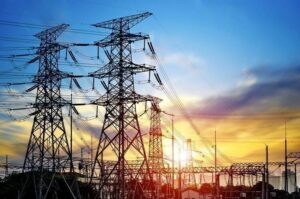
Corum Druzhkivka Machine Building Plant (Corum DrMZ), part of the Corum Group (DTEK Energy), plans to ship a skip with a lifting capacity of 23 tons for the DTEK Energo mine in late 2025 or early 2026, the plant announced on Facebook.
“This is not the largest skip in the history of Corum DrMZ, but it belongs to a large type series. Its height is about 16 m. The new equipment is part of the mine’s lifting complex upgrade program,” the statement said.
The skip is designed to transport coal and rock mass along the vertical shaft of the mine.
The plant also reports that by the end of this year, it plans to complete the manufacture and delivery of metal structures for energy infrastructure facilities.
“These are complex dimensional elements that must operate within a precisely defined geometry and integrate accurately into existing structures. The length of individual items reaches almost 45 m, and the total tonnage of metal exceeds 110 tons,” the company notes.
According to Korum DrMZ, it has manufactured similar metal structures before: in the spring of this year, the volume of similar work amounted to more than 97 tons.
“The current order is a one-off, but the plant is well acquainted with this type of work and has the technical expertise,” the statement said.
Korum DrMZ, which relocated from Druzhkivka (Donetsk region) to Dnipro in 2022, in January-September this year, according to YouControl, incurred losses of almost UAH 90 million, compared to a net profit of UAH 4.6 million for the same period last year and slightly lower net sales revenue of UAH 844.6 million.
In January-October, the plant manufactured 336 units of mining equipment, repaired 12 units of equipment, and produced over 821,000 parts.
Corum Group is a leading manufacturer of mining equipment in Ukraine. It is part of DTEK Energy, an operating company responsible for coal mining and coal-fired power generation within Rinat Akhmetov’s DTEK energy holding.

The crop division of the Alebor Group grain trading company has completed the 2025 production season, the company’s press service reported on Facebook.
According to the report, the company’s specialists grew and harvested wheat from 2,000 hectares with a yield of over 7 tons/hectare, corn from 1,100 hectares with a yield of 14.5 tons/hectare, rapeseed from 1,500 hectares with a yield of 3.6 tons per hectare, and sunflower from 1,800 hectares with a yield of 3.85 tons per hectare.
Alebor Group is a trading company founded in 2006 in the Cherkasy region. Its structure includes the Khristinivskoye Grain Receiving Enterprise (with a storage capacity of 74,000 tons of grain), the Voronovitske Grain Receiving Enterprise (104,000 tons of grain), Chesne Grain Receiving Enterprise (27,500 tons of grain), transport companies Boleko and Avtoera with a fleet of 210 heavy-duty grain trucks, and construction company Alebor Real Estate.
According to information on the company’s website, Alebor Group is one of the top 20 grain trading companies in Ukraine, exporting about 2 million tons of grain annually. The group has its own land bank of 6,500 hectares. The company’s founder is Oleksiy Kustov.
KMZ Industries is the largest manufacturer of elevator equipment in Ukraine and produces a full range of products, including silos, grain dryers, transport equipment, and separators, as well as providing automation and installation services.
According to the company, it has built more than 5,000 facilities. KMZ Industries silos with a total volume of more than 12.5 million cubic meters are in operation.

The US International Development Finance Corporation (DFC) approved a $40 million loan agreement for a 10-year term for one of the subsidiaries of Ukraine’s largest sugar producer, Astarta Agricultural Holding.
“DFC will co-finance with the International Finance Corporation capital investments and operating expenses related to the construction of a soybean protein concentrate (SPC) plant,” the agricultural holding company said.
According to Vyacheslav Chuk, director of commercial operations and strategic marketing at the agricultural holding, in September 2025, Astarta intends to continue investing in the construction of its soy protein concentrate plant in 2026, with investments amounting to approximately EUR 40 million.
In 2024, Astarta began investing in the construction of a plant for processing soybean meal into soy protein concentrate with a capacity of 500 tons/day (approximately 100,000 tons/year) in the Hlobyn Industrial Complex (Poltava region). The agricultural holding will invest over EUR 76 million in the purchase of equipment and technologies and will create 110 new jobs.
Astarta and its structural unit Astarta Agro Protein signed the first investment agreement with the Ukrainian government to receive compensation from the state for significant investments. Under the agreement, the state will provide the agricultural holding with a number of incentives, including exemption from import duties on new equipment, import VAT on new equipment, and income tax for up to five years.
Astarta is a vertically integrated agro-industrial holding company operating in eight regions of Ukraine and is the largest sugar producer in Ukraine. It comprises six sugar factories, agricultural enterprises with a land bank of 220,000 hectares, dairy farms with 22,000 head of cattle, an oil extraction plant in Hlobyn (Poltava region), seven elevators, and a biogas complex.
In the first half of 2025, Astarta reduced its net profit by 10.3% to EUR47.11 million, and its consolidated revenue decreased by 29.3% to EUR320.71 million.

The agricultural company Cygnet has completed the 2025 sugar production season and produced 31.4 thousand tons of sugar between September 30 and December 18, according to its press service on Facebook.
“The average daily processing was 2.8 tons of sugar beets per day. The sugar content of the raw materials received was 17.25%. Overall, the 2025 season was characterized by difficult weather conditions. Due to the rainy autumn, transporting beets from the fields was a difficult task. The sugar factory received and processed 216.6 thousand tons of beets. It produced 31.4 thousand tons of sugar, 98% of which is category I,” said Pavlo Perkhalo, head of the sugar production department, whose words are quoted in the report.
He specified that due to the weather, the company was forced to reduce its average daily processing by 10%, but overall the results are good. The juice extraction period lasted 77 days.
Cygnet cultivates about 29,000 hectares in the Zhytomyr and Vinnytsia regions, where it grows corn, soybeans, winter wheat, and sugar beets. The company’s assets include an elevator with a simultaneous storage capacity of 60,000 tons and a sugar factory with a processing capacity of up to 2,800 tons of beets per day (both in the Zhytomyr region).
The company also has a dairy business (605 cows), whose products are sold to local processors.

Ukraine imports record amounts of electricity from the EU, but millions of consumers still sit without electricity for 12-16 hours or more. In other words, there are imports, but no electricity. This raises a logical question: where are the megawatts “lost”?
However, the paradox is easily explained: imports are not “light in the socket,” but only an additional source of power. For electricity to reach a particular neighborhood or building, highways, substations, and distribution networks must be operational—and that is where the biggest problems lie today.
The issue is further exacerbated by the fact that after large-scale shelling in early December, the capacity of nuclear power plants (which are the base generation of the Ukrainian power system) was reduced. According to the IAEA, damage to the networks led to the shutdown of some units or their transfer to reduced capacity. Therefore, the topic of imports has been discussed very actively at all levels recently.
November already showed a systemic gap. Electricity exports fell by 94% compared to October 2025, to 5.3 thousand MWh, and have virtually stopped since November 11. Recall that in October, Ukrainian electricity exports fell by 85% compared to September. Imports, on the contrary, increased by 17% to approximately 415,000 MWh, reaching their highest level since the beginning of the year.
Data for December is not yet available, but it is already clear that Ukraine remains a net importer of electricity for the second month in a row. The structure of supplies has changed somewhat: as in October, Hungary is the largest supplier (about 44%), but the shares of Slovakia (10 times) and Moldova (2 times) have increased significantly. At the same time, Poland and Romania have declined in the structure of electricity imports.
On December 1, the maximum available import cross-section was increased from 2.1 to 2.3 GW, but it should be noted that both figures are still more theoretical. After all, the average actual use of the cross-section in November was only about 27%, with peaks of up to 88% at certain hours.
In other words, the resource is there, but not always where and when it is needed. There are several main reasons why even the available electricity does not reach the end consumer.
The market responds to shortages with prices. In November 2025, the Ukrainian day-ahead market became one of the most expensive in Europe (with a price of around €140 per MWh), while in Sweden the price was around €36/MWh and in France, for example, €43/MWh.
This is not about the “greed” of sellers and suppliers, but about the lack of cheap domestic supply and network constraints.
The EU is increasing inter-state flows, which lowers prices and adds flexibility. In 2024, France increased its nuclear and hydroelectric power generation and became the largest net exporter in the region.
But even France’s record surplus is not an automatic “magic bullet” for Ukraine. The reason is asymmetry of time and place: surpluses often occur at times when we have a different load profile, and at nodes from which we cannot quickly “pump” megawatts.
Some EU countries also have electricity surpluses, especially during so-called solar and wind windows, and are also looking for places to sell their surpluses. But the same problems arise: complex logistics (both in the EU and in Ukraine) and load asymmetry.
In other words, imports can be very useful, but they should not be seen as a strategy to replace our own maneuverable capacity.
However, the current situation is not hopeless. Ukrenergo expects a gradual reduction in restrictions as damaged facilities are repaired and there are no new attacks.
The government is synchronizing restoration, construction of protective structures, creation of fuel reserves, and connection of cogeneration plants to the grid. This will add local capacity where it is most needed.
The effect of increasing the cross-section to 2.3 GW is there, but it is limited by internal nodes. The closest practical relief will come from connecting decentralized sources and restoring networks.
In the coming weeks, the focus will be on speed and accuracy. First of all, it is necessary to restore throughput capacity in critical corridors and key substations, where a single replacement of a transformer or circuit breaker returns tens of megawatts to the city.
Mobile substations, field crews, and “hot” equipment logistics are a matter of hours and days, not months.
At the same time, cogeneration, gas piston, and gas turbine units need to be connected to the grid in deficient nodes. Where “black holes” of evening peak demand appear on the map, local generation can “pick up” the load.
In the next few months, the transition to managed demand will become key. Industry and large commercial consumers are able to “smooth out” the load according to clear rules and compensation. This is not an abstraction: power restriction schedules (PRS) are already in place, but they need to be transformed into civilized DR (demand response) programs with a predictable effect.
It is also necessary to continue creating additional “west-east” corridors, additional switching nodes in the 330-750 kV network, and local reserves around megacities and large substations. Energy storage devices in large nodes support the system during 2-3 peak hours and reduce the duration of GPP.
In the long term, more game-changing capacity is needed. We need 3.5-4 GW of new decentralized maneuverable generation, as close to the consumer as possible. Gas installations, cogeneration clusters for heat and electricity, microgrids for critical areas — all this makes the system less dependent on one or two nodes.
Engineering logic must go hand in hand with institutional logic: transparent corporate governance, stable settlement rules, and rapid procurement of critical equipment. Without trust, there will be no funding; without funding, there will be no underground distribution points, reinforced intersections, or warehouses with backup transformers.
Don’t expect a magic button that will turn off the GPV overnight. A realistic scenario is a gradual reduction in the duration and severity of outages in regions where:
– at least part of the west-east trunk lines have been restored;
– local cogeneration/gas plants are connected;
– demand management programs for businesses are in place;
– critical infrastructure is provided with reserves.
This is a “mosaic of solutions”: each piece separately does not save the day, but together they have a tangible effect.
Imports with a potential of 2.3 GW may be a temporary salvation, but by no means a panacea. As long as high-voltage lines and power transmission nodes remain damaged, imported megawatts will not turn into light in homes.
The path to shorter outages lies in three quick actions:
At the same time, it is necessary to invest in our own maneuvering capacity and the development of central and local networks. Record imports are a symptom of an open wound. It is treated not with intersection figures, but with systematic rehabilitation of networks and a return of trust in the rules of the game.
Source: https://expertsclub.eu/analiz-potochnoyi-sytuacziyi-z-importom-elektroenergiyi-v-ukrayini/